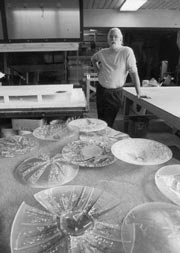Washington State Patrol forensic chemist Michael Hoover has sealed the fate of defendants in hundreds of drug- related cases in Snohomish County with his expertise and testimony. But now the 51-year-old chemist is himself at the center of a criminal investigation for allegedly stealing drugs and tampering with evidence sent to the patrol’s Marysville crime lab for testing. Prosecutors acknowledge that Hoover’s alleged actions have prompted the reexamination of hundreds, perhaps thousands, of drug cases. Several drug-related cases that were recently processed by Hoover have already been dismissed in light of the allegations.
Hoover, an 11-year veteran of the patrol, has not been arrested or charged with any crimes but remains on administrative leave pending the completion of an investigation by the Washington State Patrol. The investigation’s results are expected to be forwarded to Snohomish County prosecutors at any time. Hoover is under investigation for felony theft, violation of state drug laws, and tampering with evidence, according to a search warrant affidavit filed late last month.
Contacted at his home, Hoover calmly stated, “At this point, I can’t talk about [the investigation].” However, he did acknowledge that he is looking for a lawyer.
Hoover is suspected of stealing drugs—principally heroin—sent to the lab for testing, as well as taking evidence from the locked case files of coworkers.
Patrol detectives began their investigation after receiving reports from Hoover’s coworkers describing his behavior as “secretive” and “furtive,” the search warrant states. Court documents also indicate that Hoover’s supervisor and coworkers were concerned by his insistence on handling “an unreasonably high amount” of heroin cases that came into the lab. Hoover began using heroin meant for testing to treat his chronic back pain, according to published reports of a discussion between the chemist and patrol detectives.
The investigation has prompted both Snohomish County prosecutors and public defenders to work overtime sifting through drug cases, past and present, in order to pinpoint which cases were worked on by Hoover. All parties want to determine if Hoover’s alleged tampering undermined these cases.
The Snohomish County Prosecutors Office would not comment on the investigation, but the county’s chief criminal prosecutor, Jim Townsend, has publicly acknowledged Hoover might have worked on hundreds, and potentially thousands, of cases that now have to be examined. The impacts of the investigation of Hoover and scrutiny of the lab have already resulted in the dismissal of cases set to go to court in the past few weeks.
Depending on the outcome of the criminal investigation, many more defendants who are up on drug charges may find their cases dismissed, says Natalie Tarantino, a Snohomish County public defender. She also points out that people currently serving felony sentences could get their charges reduced to misdemeanors if it is determined their cases were compromised. Tarantino asserts this is not a case of letting hardened criminals walk because of a technicality. “I don’t see that guilty people are getting off here,” she says. “The state is required to bring quality evidence to court.”
While it is unclear how long the alleged misconduct may have been going on, Hoover’s actions at the lab have been under the microscope for some time.
According to court documents, lab chemists David Northrop and James Boaz reported to forensic scientist Erik Neilson, the lab’s supervisor, what they characterized as “inappropriate behavior” by Hoover, “giving the appearance of the taking or use of drug evidence.” Neilson also says, the document continues, that Hoover has taken heroin from the locked case files of other chemists and performed tests on exceptionally large portions of the drug.
Boaz and Northrop noticed large amounts of drug evidence being left out and some hidden in an evaporation dish placed in Hoover’s work station, the search warrant indicates. One sample of a drug left on an evaporation dish in Hoover’s possession was tested and determined to be heroin, the court document states.
On December 15, patrol detectives installed a surveillance camera above Hoover’s work space that captured him apparently stealing drugs and stashing them in his pockets more than 15 times in the course of a week, court documents show. Supervisor Neilson stated to detectives upon viewing the tape that the products Hoover was taking were controlled substances, according to the search warrant.
One week later, an evidence report states, patrol detectives searched Hoover’s office and car and seized items including a broken mirror, a vial with a heroin label, another vial labeled “Meth white powder,” and a plastic bag containing “brown crystals.”
Some have argued the patrol should not have been allowed to investigate one of their own. But Patrol spokesman Capt. Eric Robertson says it is standard procedure for the patrol to handle such investigations. “We often do cases involving our own employees,” Robertson says. “We have a long record of holding our employees accountable for their work.”
Robertson would not offer any specifics on the case since the investigation is ongoing, but did say that there have been no prior incidents involving Hoover during his tenure at the lab.
Public defender Tarantino says the accusations of misconduct by the chemist cast a pall on all procedures at the lab. She asserts that regardless of how the investigation shakes out, even evidence not processed by Hoover may be challenged in court. “(We) take for granted the lab is running in a professional manner,” she says. “If things are that lax and sloppy at the lab, it will affect all cases at that lab.”







